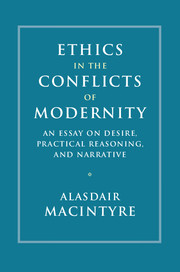Book contents
4 - NeoAristotelianism developed in contemporary Thomistic terms: issues of relevance and rational justification
Published online by Cambridge University Press: 01 December 2016
Summary
Problems posed for NeoAristotelians
In the first chapter of this essay, I set out and defended, even if only up to a point, a NeoAristotelian account of ‘good’ and good in the course of attempting to say what we mean when, as rational agents, we speak of someone as having good reasons for desiring this or that. Now I need to develop this account further in order to address questions posed in the second and third chapters, both questions about the relevance to contemporary agents in their everyday lives of the kind of NeoAristotelian view that I have advanced and questions about how the central theses of that account are to be rationally justified in contemporary terms. It will be less misleading from now on to speak of my view as a Thomistic Aristotelianism, although always with the qualification that it is in some respects a view unacceptable to many Thomists, some because, following Gilson, they take Aristotle and Aquinas to be at odds at key points, others because they differ from me in their understanding of both Aristotle and Aquinas. What is worth noting at the outset is that issues of relevance and issues of rational justification are closely related. For the claim that a Thomistic Aristotelian politics and ethics is relevant to contemporary agents in their everyday lives would be groundless if such agents were not able to provide for themselves and others an adequate rational justification for judging and acting as such a politics and ethics dictate.
Those plain persons with whom Thomistic Aristotelians enter into conversation nowadays commonly lead double lives, something of which they are often not aware, and, even when aware, may not be able to make fully explicit. On the one hand – and here I am relying on what was said earlier about the contemporary social order – they inhabit a social world structured to some large degree by the institutions of state, market, and Morality and find themselves in social relationships shaped directly and indirectly by these. It is mostly taken for granted that what they want is what the dominant social institutions have influenced them to want and the practical thinking of those others with whom they engage is for the most part informed by the ethics-of-the-state, the ethics-of-the-market, and the norms of Morality.
- Type
- Chapter
- Information
- Ethics in the Conflicts of ModernityAn Essay on Desire, Practical Reasoning, and Narrative, pp. 166 - 242Publisher: Cambridge University PressPrint publication year: 2016

